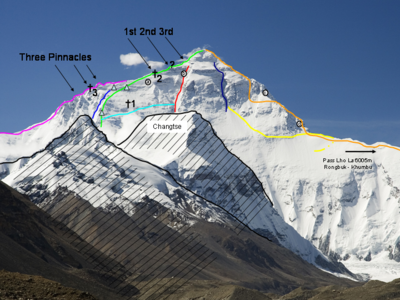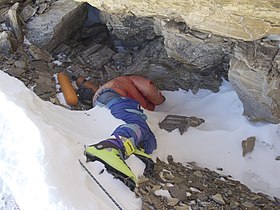
The Three Steps are three prominent rocky steps on the northeast ridge of Mount Everest. They are located at altitudes of 8,564 metres (28,097 ft), 8,610 metres (28,250 ft), and 8,710 metres (28,580 ft). The Second Step is especially significant both historically and in mountaineering terms. Any climber who wants to climb on the normal route from the north of the summit must negotiate these three stages.

The First Step consists of large boulders that pose a serious obstacle, even for experienced climbers, because of their location high in the Death Zone. Many mountaineers have died near the First Step, among them "Green Boots", a corpse wearing neon green climbing boots and a red coat, which serves as a somber landmark for climbers to gauge their distance to the top, and which has now been possibly identified as Tsewang Paljor.[1] His fellow climbers, who also perished on the same day as he in 1996, are Tsewang Smanla and Dorje Morup.[1] Other climbers have died under that rock as well, namely David Sharp.
The Second Step is the best known of the rocky steps. The steep section, at an altitude of 8,610 m, has a climbing height of 40 metres (130 ft), of which the last five are almost vertical. The step was apparently climbed for the first time in 1960 when Wang Fuzhou, Gongbu and Qu Yinhua claimed to have completed the first ascent via the north ridge, with their teammate Liu Lianman volunteering to be a human ladder up the step. Despite being widely accepted, there is inconclusive evidence to support the claim. The climbing difficulty of this spot was reduced in 1975 when a Chinese team affixed an aluminium ladder to the step that has been used since then by almost all climbers. In 2007, out of safety considerations, the original 15 feet (4.6 m) ladder was replaced with a new one by Chinese and international mountaineers. The original ladder is now on display at the Mount Qomolangma Museum in Tibet.[2]
The Third Step is easiest to climb. Its climbing height is about 10 metres (33 ft), after which the summit snowfield is reached.
- ^ a b Nuwer, Rachel (October 2015). "The tragic tale of Mt Everest's most famous dead body". BBC. Retrieved 12 March 2016.
- ^ "Chinese Ladder Retires". crienglish.com. Beijing, China: China Radio International. 28 May 2008. Archived from the original on 23 November 2019. Retrieved 5 May 2023.